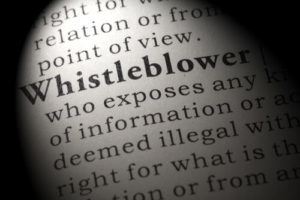Whistleblowing As a Civic Duty: Now Is the Time To Act

With voting in the 2020 election underway and the presidential debates behind us, now is a good time to reflect on the importance of civic duties to the preservation of American democracy. Voting, paying taxes, serving on a jury, and registering with selective service are all examples of such duties—responsibilities which, if ignored or unfulfilled by enough individuals, will cause the institutional fabric holding our system of government together to fray and fall apart. But often overlooked in discussions of civic duties is one particular responsibility: whistleblowing.
Whistleblowers are individuals who provide evidence of significant wrongdoing within an agency or organization to appropriate authorities, sometimes at great personal risk. To “blow the whistle” is to call attention to fraudulent or unethical conduct that might otherwise go unseen and uncorrected. Too often, whistleblowers are viewed as disgruntled or “crazy” individuals with a personal or political agenda who misperceive the facts of a situation and interfere with the normal operations of an organization. Some whistleblowers may fall into this category. But to caricature all whistleblowers in this negative fashion is to ignore the important and positive role that many whistleblowers play in keeping our democracy alive and well.
Consider a neighborhood watch. When we live in a community, we rely in part on our neighbors to help keep us safe by reporting any criminal activity they might observe. We then rely on the police to investigate alleged criminal activity in a fair, unbiased, and professional manner. Were a neighbor to observe but fail to report someone breaking into our house, either to us or to the local police, we would consider them to have failed to act on their civic duty to help keep the community safe.
Whistleblowing is similar to a neighborhood watch, but on a broader societal scale. If an individual observes fraudulent conduct targeting a government agency or program, they have a civic duty to report this misconduct to the proper authorities or, in some circumstances, such as when the authorities can’t be trusted or unreasonably fail to act, directly to the public.
The failure to act on civic duties puts our democratic institutions at risk. For example, if enough people fail to vote, we are a democracy in name only, an empty shell into which flow the dangerous ideologies and selfish interests of others, including those fundamentally opposed to the ideals and principles in our founding documents, the Declaration of Independence, Constitution, and Bill of Rights.
The same threat is posed by the failure to fulfill our civic duty to act as whistleblowers. If individuals with knowledge of fraud or corruption in government programs do not step forward and reveal this information to authorities willing and able to take corrective action, or directly to the public, the community that depends on the integrity of the government agency or program will be harmed. The more people who depend on a government program, or the more central it is to our democratic institutions, the more important it is that individuals with knowledge of misconduct step forward and blow the whistle in a timely manner.
With the presidential election less than two weeks away, now is the time for any additional whistleblowers with knowledge of fraud or corruption in the Trump Administration, or elsewhere in the government, to speak out and make this information public. To paraphrase Albert Einstein, a democracy will not be destroyed by those who do evil, but by those who watch without doing anything.
If you would like information about whistleblower reward or protection programs or would like to speak to a member of Constantine Cannon’s whistleblower lawyer team, please click here.
Read More:
- False Claims Act
- Government Contracting Fraud
- Healthcare and Pharmaceutical Fraud
- Fraud in Other Government Programs
- Covid-19 Fraud
- Whistleblower Reward Laws
- Whistleblower Protection Laws
- Whistleblower Types
- Our Successes
- I think I have a whistleblower case
- Contact a whistleblower attorney for a confidential consultation
Tagged in: Defense Contract Fraud, FCA Federal, Government Procurement Fraud, Importance of Whistleblowers, Whistleblower Eligibility, Whistleblower Protection Laws, Whistleblower Rewards,